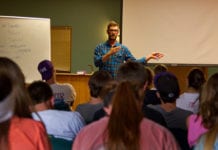“Rapidly growing groups during a church-wide campaign has a very positive upside. New leaders get their gifts in the game. New people are connected into new groups. Relationships are developed. Believers are discipled. There are awesome results all around. The problem comes in caring for new leaders when your coaching structure is already overwhelmed. Where do you get new coaches?” Allen White
______________________________________
In a recent post, I pointed out the fact that we’re not living in “a day when the status quo is a good thing. At the beginning of the second decade of the 21st century…it is clearly time to develop a bias toward what’s next.” To help all of us figure out what’s next, I’ve asked a number of the best-known grouplife practitioners to share their latest learnings. Here’s what Allen White had to say:
________________________________________
I ran into this problem a few years ago, when we doubled the number of our small groups in one day. We didn’t feel we were adequately coaching the first half. Now, we needed to help an equal number of newbies. Then, the light bulb turned on. If half of the groups are new and half of the groups are experienced, we just needed to match them up. We created a “buddy system” with experienced leaders helping new leaders. Never let a good crisis go to waste.
Over the years, this coaching strategy was finessed into an intentional approach rather than a last ditch effort. In advance of a new church-wide campaign, we expect dozens, if not hundreds, of new leaders or hosts to step forward. Otherwise, why would we do a church-wide campaign? In anticipation of this new growth, we also know that we will need new coaches to encourage the new leaders. Where do we get the new coaches?
At least a month before we start recruiting new leaders and host homes, we gather all of our existing leaders for a “Sneak Peek” event to reveal the Fall campaign curriculum. This is a great way to rally the troops and get our existing groups in on the new series. We explain all of the details of the series. We cast vision for new people connecting in groups and for new leaders starting new groups. Then, we present an opportunity for our existing leaders to “walk alongside” a new leader just for the six week campaign. Notice that we don’t use the word “coach” at this point.
The ask goes like this: “Once upon a time, you were a brand new leader who had a lot of questions and a few fears about starting a new group. Some of you had a coach. Some did not. All of us need someone in our corner to encourage us, to pray for us, and to answer our questions. Would you be willing to do that for a new leader or group host during this next series? The commitment starts when the leader attends the host briefing and goes through the six week campaign.” And, our existing leaders sign up to help every time.
The job description is simple. We ask them to do three things: (1) Pray for the new leaders. (2) Contact them every week in a way that’s meaningful to the new leader (not in a way that’s merely efficient for the new coach). (3) Answer their questions.
During the New Host Briefing, I match the new leaders and group hosts with their new “coach.” Usually I start the meeting by introducing the series content and the timeline, then I tell the new leaders, “Now, I would like to introduce some very important people to you who are going to help you get your group started. They will be available to answer all of your questions as you’re getting started.” I introduce the new “coaches” and pair them up with the new leaders according to the type of group they are starting or the geographical region where they live. The “coaches” take over the meeting at this point and give the new leaders all of the details of how to gather their group, what to do the first night, and answer any questions they have already. They exchange contact information and the “coaching” begins.
After the six week campaign, we check in with the new “coaches” about their experience. We ask three key questions:
- How important do you feel you were to the new leaders?
- How easy was it to keep in contact with the new leaders?
- Which of the new groups plan to continue?
The results are uncanny. If the new “coach” has the ability to coach, the answers are always come out: “My help was very important to the new leaders. Contacting them was easy. Most of the groups continued.” If the new “coach” doesn’t have it, the responses are: “My help wasn’t important. Contact was difficult. Most of the groups will not continue.” There is very little middle ground.
For the new coaches that answer positively, we invite them to continue coaching. For those who answer negatively, we thank them for serving for six weeks, and let them go back to leading their groups. You might be asking, “But, isn’t it risky to give a new leader to an inexperienced coach?”
It’s risky working with people period. Personally, I’d rather hire staff to do all of the coaching, but who has the budget for that? What’s more risky is sending out a new leader or group host without a coach. The payoff here is that new groups will be established, and new coaches will be recruited.
I’ve stopped recruiting with a job description over coffee. I don’t always do a great job choosing coaching candidates. What I have learned is that sometimes the most unlikely people make the best coaches and leaders. Let the trial run define who has what it takes to coach.
What do you think? Have a question? You can click here to jump into the conversation.
_________________________________
Allen White is one of the smartest guys I know in the small group movement. If you don’t know him, you need to. You can read the rest of his bio right here, check out his blog right here and follow him on Twitter right here.










